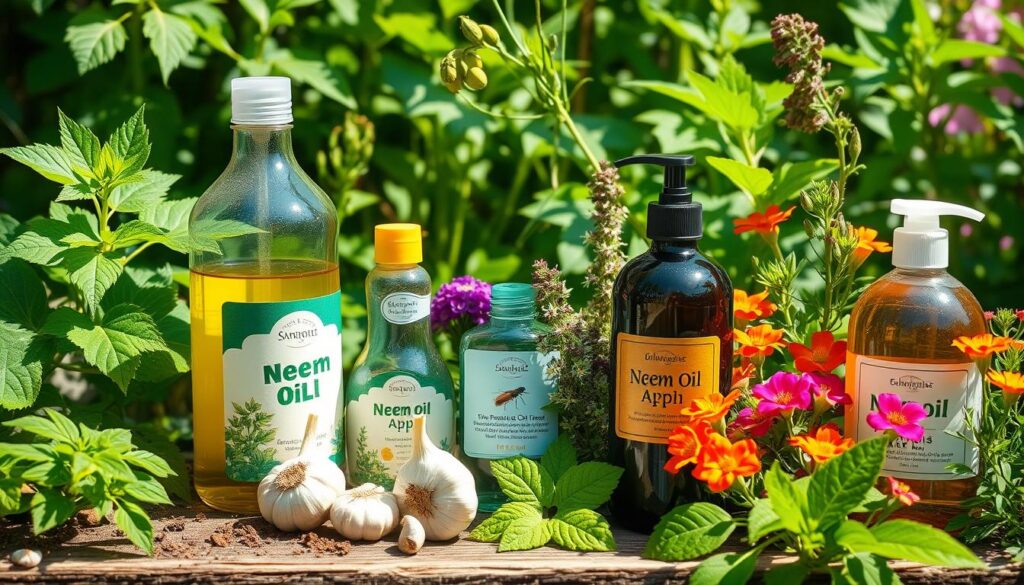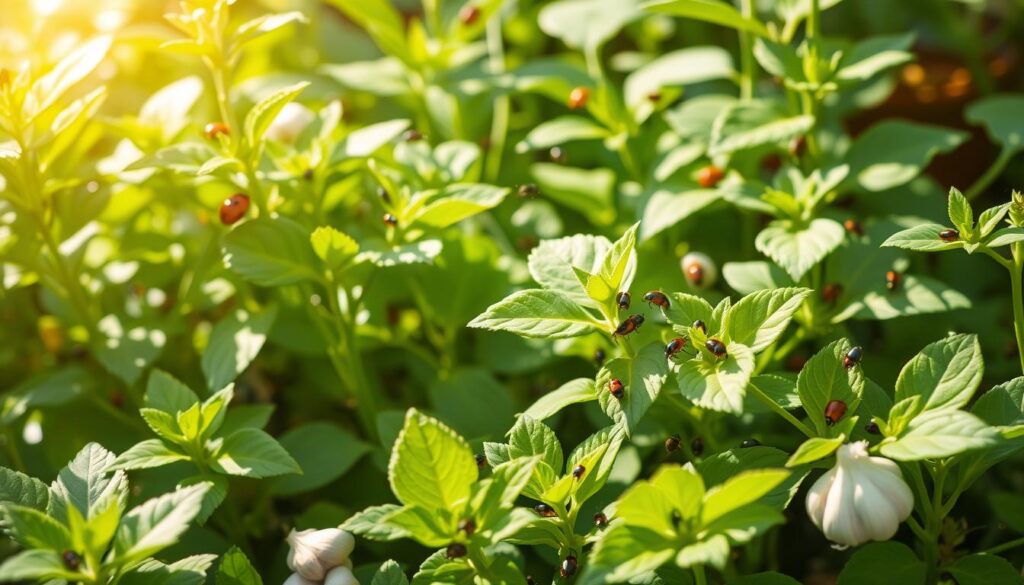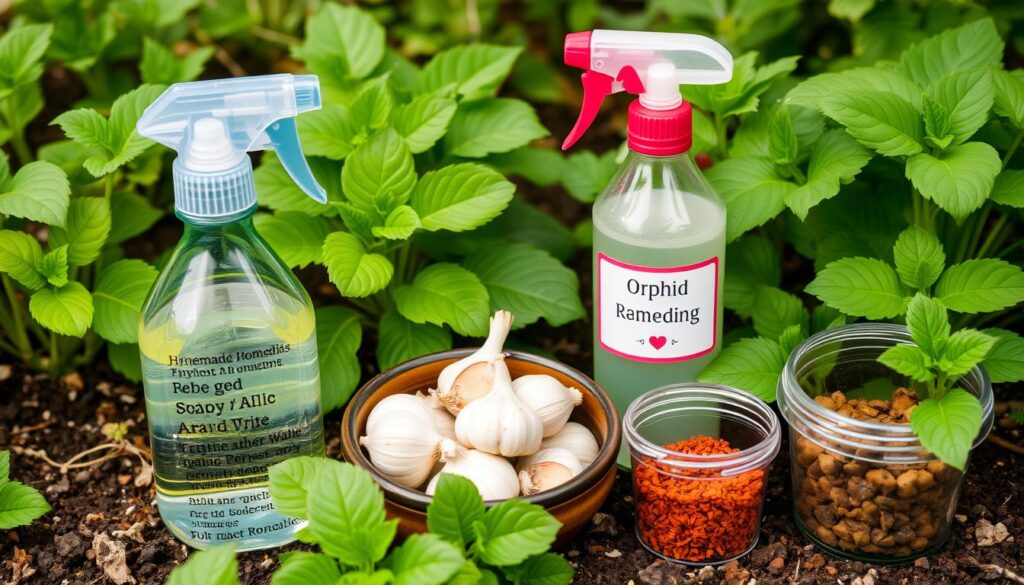As the sun rose over a lush garden, Emily enjoyed her morning coffee. She looked at her tomato plants, which had been doing well just weeks before. But now, tiny green pests had appeared on her plants. These were aphids, known for eating a lot and harming crops.
Instead of using chemicals, Emily remembered her neighbor’s advice. “There are natural ways to fight aphids without harming the environment.” She decided to find these eco-friendly solutions, starting a change in her garden and helping her community.

Key Takeaways
- Natural aphid remedies provide effective treatments without harmful chemicals.
- Eco-friendly aphid solutions help maintain plant health and protect beneficial insects.
- Non-toxic plant protection fosters sustainable gardening practices.
- Employing homemade remedies can save costs while enhancing gardening skills.
- Healthy soil contributes to greater resistance against aphid infestations.
Understanding Aphids and Their Impact on Plants
Aphids are small, sap-sucking insects that harm many plants. They reproduce fast and spread quickly, making pest control hard. Knowing about aphids and their effects is key to protecting plants naturally.
What Are Aphids?
Aphids are part of the Aphididae family, found in gardens and fields. They are small, 1 to 10 mm long, and can be green, black, or pink. Their soft bodies and long antennae are distinctive. They suck plant sap, weakening plants and slowing growth.
The Damage Caused by Aphids
Aphids can harm plants in many ways. Some common problems include:
- Wilting leaves: Plants may wilt because they can’t get the nutrients they need.
- Stunted growth: Aphids can stop plants from growing well, making them smaller and weaker.
- Honeydew production: Aphids release honeydew, a sticky substance that attracts pests and grows sooty mold.
Signs of Aphid Infestation
It’s important to know the signs of aphid infestation. Some common signs are:
- Yellowing leaves: Yellow leaves, or chlorosis, are often the first sign of aphid damage.
- Sticky residues: Honeydew leaves a shiny, sticky residue on leaves and surfaces.
- Physical presence: Adults and nymphs can be seen on the undersides of leaves, clustering together.
Natural Aphid Remedies: Protecting Plants Without Chemicals
Natural remedies are great for gardeners fighting aphids. They help keep gardens healthy and safe. Using natural remedies is good for the environment too.
Benefits of Using Natural Remedies
There are many good things about using natural remedies:
- Safer for Beneficial Insects: They don’t hurt good bugs, keeping the garden balanced.
- Less Toxicity: They’re safer for people and pets than chemical pesticides.
- Soil Health: They keep the soil healthy, which is key for gardening.
Understanding Eco-Friendly Solutions
Eco-friendly gardening is important today. It helps keep the environment safe. By using these methods, gardeners can keep plants healthy and stop aphids.
- Neem oil stops aphids without harming other bugs.
- Garlic and pepper sprays keep pests away naturally.
Why Choose Chemical-Free Options?
Going chemical-free is good for the planet. It helps keep gardens healthy and safe. Natural remedies:
- Protect important insects like pollinators.
- Make the soil better for plants, helping them fight pests.
- Make gardens better for future gardeners.

| Aspect | Natural Remedies | Chemical Treatments |
|---|---|---|
| Impact on Beneficial Insects | Minimal harm | Often harmful |
| Toxicity Level | Low | High |
| Soil Health | Improves | Can degrade |
| Biodiversity Support | Encourages | Discourages |
Effective Homemade Aphid Remedies
Gardening fans can fight aphids with homemade solutions. DIY aphid sprays from common items are a simple yet strong way to control pests. Also, making herbal aphid repellents and natural insecticides adds extra protection for plants.
DIY Aphid Sprays Using Household Ingredients
DIY aphid sprays are a great way to deal with aphids. A basic mix is mild dish soap and water. This combo kills aphids on contact. Here’s a simple recipe:
- 1 tablespoon of mild dish soap
- 1 quart of water
Mix well and put it in a spray bottle. Spray it on plants every few days until aphids are gone.
Creating Herbal Aphid Repellents
Herbal aphid repellents use plants to keep pests away. Neem oil is known for repelling aphids. To make one, follow this recipe:
- 2 tablespoons of neem oil
- 1 teaspoon of liquid soap
- 1 quart of water
Put the ingredients in a spray bottle. Shake it well before spraying on plants to keep aphids away. Garlic is also good; steep crushed cloves in water for 24 hours for a strong spray.
Natural Insecticides for Aphid Control
There are also natural insecticides for aphids. A homemade one can be made from these ingredients:
- 1 cup of crushed red pepper
- 1 tablespoon of liquid soap
- 1 gallon of water
Let it sit overnight and strain it before using. This mix stops aphids from eating and controls infestations.

| Remedy Type | Main Ingredient(s) | Application Frequency |
|---|---|---|
| DIY Spray | Mild dish soap and water | Every few days |
| Herbal Repellent | Neem oil | Weekly |
| Natural Insecticide | Crushed red pepper | As needed |
These homemade aphid remedies offer easy, chemical-free ways to protect plants. Trying these methods can lead to a healthy garden without pests.
Preventing Aphid Infestations Naturally
Effective ways to stop aphids include using green gardening methods. These methods make plants strong and keep pests away. They also help plants fight off pests on their own.
Sustainable Gardening Practices to Deter Aphids
Green gardening keeps aphids away naturally. Here are some ways to do it:
- Use organic fertilizers and compost to make plants strong.
- Rotate crops to break aphid life cycles.
- Use natural pesticides only when needed, focusing on stopping problems before they start.
Planting Companion Species
Planting certain species together helps keep aphids away. These plants protect other plants from aphids. Some good plants to use include:
- Nasturtiums, which draw aphids away from other plants.
- Garlic and chives, known for keeping pests away.
- Asters, which attract insects that eat aphids.
Maintaining Healthy Soil and Plant Health
Strong plants come from healthy soil. To keep soil healthy, do these things:
- Add organic matter like compost or worm castings often.
- Use mulch to keep moisture in and weeds out.
- Don’t disturb the soil too much with no-till gardening.
Conclusion
Using natural aphid remedies is key for sustainable gardening. Eco-friendly solutions help manage aphids without harmful chemicals. This approach keeps plants healthy and supports the ecosystem.
Chemical-free pest control has many benefits. It reduces environmental harm and boosts garden diversity. Homemade sprays and companion planting keep aphids away and improve the garden’s health.
These practices make gardens more resilient. Plants and beneficial insects can thrive together. By following these tips, gardeners can enjoy a thriving ecosystem and healthy plants.
FAQ
What are some effective natural aphid remedies?
To fight aphids, you can make a spray with dish soap and water. You can also use herbal repellents like neem and garlic. Essential oils can make natural insecticides. These methods are safe for your garden.
How can I prevent aphid infestations in my garden?
To stop aphids, grow plants that keep them away. Keep your soil healthy with compost. Also, encourage many different plants in your garden. This makes your garden strong against pests.
Are there any eco-friendly solutions for controlling aphids?
Yes, there are many green ways to fight aphids. Use sprays made from garlic or hot peppers. Introduce ladybugs and other helpful bugs. Plant herbs to keep aphids away. These methods are good for your garden and the planet.
Why should I choose non-toxic pest control over chemical options?
Non-toxic pest control is better for you and the earth. Chemicals can hurt good bugs, soil, and water. They can also be bad for people. Natural methods keep your garden safe and healthy.
What ingredients can I use to make a homemade aphid spray?
Mix water, dish soap, and a bit of vegetable oil for a spray. It kills aphids without harming your plants. It’s easy and safe to make.
How do I know if my plants are infested with aphids?
Look for yellow leaves, sticky stuff (honeydew), and curled leaves. You might see aphids, small bugs that suck plant sap. Catching aphids early helps your plants stay healthy.
Can I use herbal treatments to repel aphids?
Yes! Herbal sprays can really help. Make a spray with neem oil or use garlic and water. These natural methods keep aphids away without harming good bugs.
What are sustainable gardening practices to deter aphids?
Good gardening includes rotating crops, helping beneficial bugs, and planting together. These methods make your garden healthy and keep aphids away. They help your garden be in balance.




